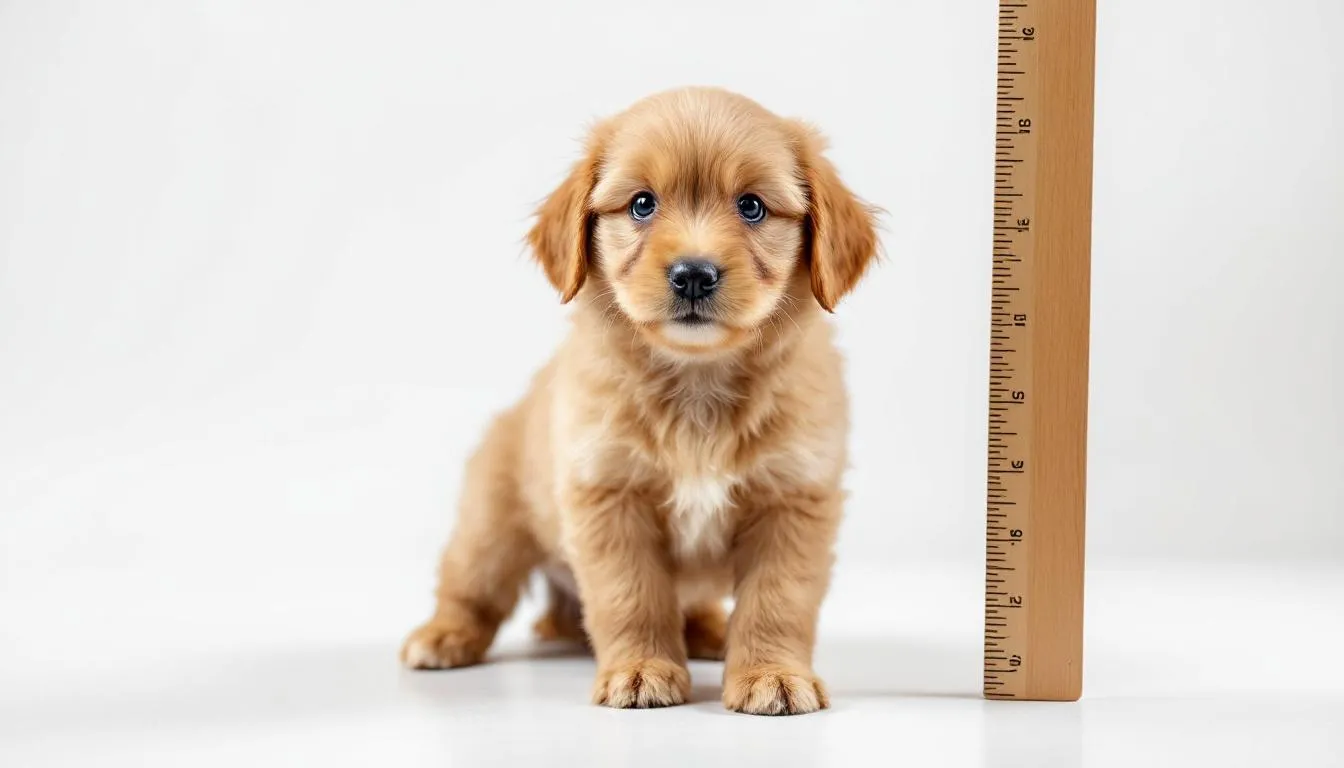

Key Takeaways
Teacup goldendoodles reach 4-15 pounds and 8-13 inches tall when fully grown at 12-18 months
- Teacup goldendoodles reach 4-15 pounds and 8-13 inches tall when fully grown at 12-18 months
- They are the smallest goldendoodle variety, created through selective breeding of miniature goldendoodles and toy poodles
- Despite their tiny size, they retain the intelligent, affectionate temperament of their golden retriever and poodle parents
- These dogs require special care due to their petite stature, including gentle handling and monitoring for size-related health issues
- Teacup goldendoodles cost between $3,000-$5,000 and have a lifespan of 14-18 years with proper care
They are the smallest goldendoodle variety, created through selective breeding of miniature goldendoodles and toy poodles
Despite their tiny size, they retain the intelligent, affectionate temperament of their golden retriever and poodle parents
These dogs require special care due to their petite stature, including gentle handling and monitoring for size-related health issues
Teacup goldendoodles cost between $3,000-$5,000 and have a lifespan of 14-18 years with proper care
When you picture the perfect companion for apartment living, a teacup goldendoodle full grown might be exactly what comes to mind. These tiny companions pack all the intelligence and charm of their larger cousins into a petite package that fits comfortably in your lap. Understanding what to expect from a fully mature teacup goldendoodle helps you make informed decisions about whether these delightful companions suit your lifestyle.
The journey from teacup goldendoodle puppies to adult dogs involves careful attention to their unique needs. Unlike larger dog breeds, these tiny dogs reach their adult size relatively quickly while requiring specialized care throughout their development. Let’s explore everything you need to know about teacup goldendoodles when they’re full grown.
What is a Teacup Goldendoodle?
A teacup goldendoodle represents the smallest variety of goldendoodle, weighing just 4-15 pounds when fully grown. These charming dogs result from crossing golden retrievers with toy poodles or miniature poodles, with the miniature poodle contributing to the breed's playful, intelligent, and hypoallergenic traits. This hybrid combines the golden retriever’s gentle nature with the poodle’s intelligence and minimal shedding coat.
The term “teacup” describes their incredibly compact size compared to standard goldendoodles, which can weigh up to 90 pounds. A standard goldendoodle is much larger, making the teacup variety a better fit for those seeking a smaller companion. Despite their tiny stature, teacup goldendoodles maintain the affectionate, playful temperament that makes goldendoodles such wonderful companions. Their poodle heritage contributes to hypoallergenic coats that make them suitable for allergy sufferers who couldn’t otherwise enjoy dog ownership.
These intelligent dogs were developed through careful breeding practices, typically involving toy poodles and the smallest available goldendoodles. The miniature goldendoodle, itself a product of selective breeding for smaller size, often plays a role in producing the teacup variety. Reputable breeders focus on maintaining the desirable traits of both parent breeds while achieving consistently small adult sizes. The result is a goldendoodle puppy that grows into a tiny companion perfectly suited for smaller living spaces.
Unlike some designer dog breeds, teacup goldendoodles retain the stable temperament and trainability of their parent breeds. Their affectionate nature makes them excellent family pets, though their delicate size requires careful handling around young children. The combination of intelligence from their poodle lineage and the friendly disposition of golden retrievers creates dogs that are both easy to train and eager to please.
Golden Retriever Influence on Teacup Goldendoodles
The golden retriever’s influence on teacup goldendoodles is at the heart of what makes these dogs such beloved companions. Golden retrievers are renowned for their gentle nature, loyalty, and intelligence—traits that shine through in teacup goldendoodles. This golden retriever heritage brings a calm, patient demeanor that beautifully balances the spirited energy of their poodle parent. As a result, teacup goldendoodles are not only affectionate and eager to please but also highly adaptable to different family dynamics and lifestyles.
Thanks to their golden retriever lineage, teacup goldendoodles are quick learners and respond exceptionally well to training. Their desire to bond with people and their innate friendliness make them excellent goldendoodles for families, singles, and seniors alike. Proper socialization from an early age helps these dogs grow into confident, well-mannered adults, showcasing the best qualities of both parent breeds. Whether you’re looking for a loyal companion or a gentle playmate for children, the golden retriever’s influence ensures that teacup goldendoodles are up to the task.


Teacup Goldendoodle Full Grown Size and Physical Characteristics
When considering a teacup goldendoodle full grown, size remains the most distinctive characteristic. Adult teacup goldendoodles typically weigh between 4-15 pounds, with most falling in the 8-12 pound range. They stand 8-13 inches tall at the shoulder, making them significantly smaller than even mini goldendoodles, which weigh 15-30 pounds. In comparison, mini goldendoodles weigh between 15 to 35 pounds, and this lighter weight means they generally require less exercise and have different care needs than standard goldendoodles.
These tiny dogs reach their full adult size between 12-18 months of age, considerably faster than larger breeds. Their compact, proportionate body structure maintains the classic goldendoodle appearance despite their reduced size. Expressive eyes and a teddy bear-like appearance make them irresistibly adorable, while their sturdy build within their tiny frame suggests good health when properly bred.
The adult size of teacup goldendoodles makes them incredibly portable. Unlike medium sized goldendoodles or standard goldendoodles, these tiny companions can easily travel in airline-approved carriers and adapt to various living environments. Their petite stature requires careful consideration of their environment, as what seems normal-sized to us can appear enormous from their perspective.
Physical characteristics include well-proportioned heads, alert expressions, and coats that reflect their poodle heritage. Their compact size doesn’t diminish their athletic ability – they’re still capable of short bursts of energetic play, though their exercise needs differ significantly from larger goldendoodles.
Growth Timeline and Development
Understanding the growth timeline helps owners provide appropriate care during each developmental stage. Teacup goldendoodle puppies experience rapid growth during their first 8-16 weeks, requiring high quality dog food specifically formulated for small breeds to support healthy development.
Between 4-6 months, the growth rate begins to slow as puppies approach their adult proportions. This period is crucial for establishing proper socialization and training routines. By 8-12 months, most teacup goldendoodles have achieved near adult size, though they may continue filling out until 12-18 months.
Monitoring growth charts helps ensure healthy development and early detection of any size-related concerns. Regular veterinary check ups during this period allow professionals to assess whether growth patterns fall within normal ranges for the breed. Grown mini goldendoodles reach their final size earlier than larger breeds, making this monitoring period relatively short but intensive.
The rapid maturation of full grown mini goldendoodles means owners must quickly adapt from puppy care to adult dog management. Understanding this timeline helps with everything from crate sizing to exercise planning.
Grown Mini Goldendoodles: How Do They Compare?
Grown mini goldendoodles offer a wonderful alternative for those who love the goldendoodle personality but prefer a slightly larger companion than the teacup variety. Mini goldendoodles typically weigh between 15-35 pounds and stand 13-20 inches tall, making them a bit more robust while still being perfectly suited for apartment living and smaller living spaces. Despite their increased size, mini goldendoodles retain the same playful, gentle, and loyal temperament that makes goldendoodles such excellent family pets.
Like teacup goldendoodles, grown mini goldendoodles thrive on mental stimulation and regular interaction with their families. They enjoy playtime, training sessions, and social outings, all of which help prevent boredom and encourage positive behavior. With proper care and attention, mini goldendoodles adapt well to a variety of living situations, from bustling city apartments to quiet suburban homes. Their affectionate nature and intelligence make them delightful companions for families, couples, and individuals seeking a loving, adaptable dog.
Coat Types and Grooming Requirements
The coat of a teacup goldendoodle reflects their mixed heritage, offering varieties that include curly, wavy, or straight textures. Colors range from cream and gold to red, apricot, and multi-colored patterns that showcase the genetic diversity of their parent breeds. Their hypoallergenic coat produces minimal shedding due to poodle genetics, making them suitable companions for allergy sufferers.
Professional grooming every 6-8 weeks maintains their coat’s health and appearance. Regular brushing prevents matting and tangles that can quickly develop in their dense coat. Daily brushing becomes essential as adult dogs develop their full coat texture, which tends to be more prone to matting than puppy fur.
Their coat type influences grooming requirements significantly. Curlier coats inherited from the poodle parent require more frequent professional attention, while straighter coats may be easier to maintain at home. Regardless of texture, all teacup goldendoodles benefit from regular grooming to prevent skin issues and maintain their hypoallergenic qualities.
The grooming routine extends beyond coat care to include nail trimming, ear cleaning, and dental care. Their small size makes them easier to handle during grooming sessions, though gentle techniques remain important to avoid stress or injury.
Hypoallergenic Benefits of Teacup Goldendoodles
One of the standout features of teacup goldendoodles is their hypoallergenic coat, a gift from their poodle heritage. This low-shedding, hypoallergenic coat produces less dander, making teacup goldendoodles an excellent choice for allergy sufferers who want to enjoy the companionship of a dog without the worry of allergic reactions. The hypoallergenic benefits of teacup goldendoodles mean that more families can welcome these charming dogs into their homes, even if allergies have been a concern in the past.
To maintain these benefits, regular grooming and proper care are essential. Routine brushing helps prevent matting and tangling, while professional grooming every few weeks keeps their coat in top condition. By staying on top of regular grooming, owners can ensure their teacup goldendoodle’s coat remains healthy, beautiful, and as hypoallergenic as possible. This combination of minimal shedding and manageable grooming needs makes teacup goldendoodles a practical and joyful addition to many households.


Temperament and Personality Traits
Teacup goldendoodles exhibit the intelligent and eager-to-please nature that makes training easier compared to many other small breeds. Their affectionate temperament creates strong family bonds, while their playful energy level provides entertainment despite their compact size. These traits reflect the best characteristics of both golden retrievers and toy poodles. The toy poodle genetics contribute not only to the teacup goldendoodle's small, hypoallergenic size but also to their alertness, intelligence, and friendly disposition.
Their social nature requires regular interaction and proper socialization to develop into confident adult dogs. Early socialization with various people, animals, and environments helps prevent the fearfulness sometimes seen in very small breeds. Despite their tiny size, well-socialized teacup goldendoodles display the confident, friendly nature typical of larger goldendoodles.
Intelligence inherited from both parent breeds makes these dogs highly trainable, though their small size can sometimes lead to behavioral issues if not properly managed. They may experience separation anxiety if left alone for extended periods, requiring gradual training to build independence.
The spirited personality of teacup goldendoodles shines through in their playful interactions and desire to be involved in family activities. Their gentle nature makes them suitable companions for older children who understand how to handle tiny dogs appropriately. Bonding with a teacup goldendoodle brings pure joy, as their loving companionship and cheerful spirit enrich daily life.
Health Considerations for Teacup Goldendoodles
Health issues specific to teacup goldendoodles often relate to their extremely small size. Common concerns include hypoglycemia, luxating patella, and dental problems that affect many tiny dogs. Their fragile bone structure requires careful handling to prevent injuries that larger dogs might easily withstand.
Regular veterinary check ups every 6 months help monitor for size-related health concerns and ensure early intervention when needed. Genetic testing from reputable breeders reduces the risk of inherited conditions, though the selective breeding required to achieve such small sizes can sometimes concentrate genetic issues.
With proper care, teacup goldendoodles enjoy a lifespan of 14-18 years, often longer than larger dog breeds. This longevity makes them excellent long-term companions, though their health care needs require dedicated attention throughout their lives. As teacup goldendoodles become older dogs, it is important to be aware of age-related health considerations and provide appropriate care to support their well-being in their senior years.
Physical health maintenance includes monitoring for signs of hypoglycemia, especially during puppyhood and times of stress. Their small body mass makes them more vulnerable to blood sugar fluctuations that could be dangerous if not promptly addressed.
Size-Related Health Concerns
The tiny stature of teacup goldendoodles creates unique health challenges not seen in larger dogs. Increased risk of injury from falls or rough play requires constant supervision, especially around larger dogs and young children. Temperature regulation challenges due to their small body mass make them vulnerable to both heat and cold extremes.
Potential breathing difficulties may occur in extreme weather conditions, as their small airways can become compromised more easily than those of larger breeds. Careful supervision around other pets becomes essential, as even friendly play from larger animals can unintentionally harm these delicate companions.
Hip dysplasia, while less common in small breeds, can still occur and may be more debilitating in tiny dogs. Regular monitoring and maintaining a healthy weight helps prevent joint stress that could lead to mobility issues.
Special dietary needs help prevent hypoglycemia, requiring frequent small meals rather than the twice-daily feeding schedule suitable for larger dogs. Understanding these size-related concerns helps owners provide appropriate care throughout their dog’s life.


Care Requirements and Daily Needs
Daily care for teacup goldendoodles differs significantly from larger breeds. Gentle exercise consisting of 20-30 minutes of light activity daily meets their physical needs without overexertion. Short walks and indoor play sessions provide adequate exercise while protecting their delicate joints and bones.
High quality dog food formulated for small breeds provides the concentrated nutrition these tiny dogs need. A balanced diet split into frequent small meals helps maintain stable blood sugar levels and prevents hypoglycemia. Fresh water should always be available, though monitoring intake helps prevent accidents in the house.
Indoor living becomes essential due to their vulnerability to weather extremes and potential predators. Soft bedding and safe spaces help prevent injuries from jumping or falling, while baby gates can create secure areas within the home.
Regular dental care takes on increased importance due to crowded teeth in their small mouths. Daily brushing and dental chews designed for small breeds help prevent the dental disease common in tiny dogs.
Training and Socialization
Early socialization proves crucial for developing confident adult behavior in teacup goldendoodles. Positive reinforcement training methods work best with these intelligent dogs, who respond well to gentle guidance and rewards. Short training sessions match their attention spans while preventing mental fatigue.
House training may take longer due to their small bladder capacity, requiring patience and frequent opportunities to eliminate outdoors. Consistency and positive reinforcement help establish reliable house training routines.
Leash training becomes important for safety during walks, as their small size makes them vulnerable to various outdoor hazards. Teaching a reliable recall command provides an extra layer of safety when off-leash exercise is appropriate.
Obedience training helps establish boundaries and expectations while building the human-dog bond. Mental stimulation through training exercises helps satisfy their intelligent nature and prevents boredom-related behavioral issues.
Proper socialization with other dogs requires careful selection of playmates. Introducing them to calm, gentle dogs of similar size helps build confidence while preventing traumatic experiences with overly enthusiastic larger dogs.
Living Arrangements and Lifestyle Compatibility
Teacup goldendoodles excel in apartment living and smaller living spaces where larger dogs might feel cramped. Their compact size makes them ideal for seniors, singles, or families with older children who understand gentle handling requirements. Like the toy goldendoodle, teacup goldendoodles are particularly well-suited for apartment living due to their petite stature and hypoallergenic, low-shedding coats.
Indoor lifestyle suits their delicate nature, though they still benefit from supervised outdoor time in secure areas. Their adaptability to various living environments makes them excellent companions for people with changing housing situations. Toy goldendoodles also thrive in similar settings, serving as affectionate, loyal companions who easily integrate into different lifestyles.
Compatibility with other pets depends on careful introductions and size considerations. They often do well with cats and other small pets when properly socialized, though supervision remains important during interactions.
Their excellent family pets status comes with the caveat that young children must be taught appropriate handling techniques. Adult supervision during interactions helps prevent accidental injuries while allowing children to enjoy their gentle nature.
The loyal companion nature of teacup goldendoodles makes them suitable for people seeking close bonds with their pets. Their desire to be near their families makes them wonderful companions for people who spend considerable time at home.
Teacup Goldendoodle Community and Support
Becoming a teacup goldendoodle owner means joining a vibrant and welcoming community of fellow enthusiasts. From reputable breeders who prioritize ethical breeding practices to online forums and social media groups, there’s a wealth of support and information available for every stage of your goldendoodle journey. Reputable breeders not only provide healthy, well-socialized puppies but also offer ongoing guidance on care, training, and health, ensuring you and your teacup goldendoodle start off on the right paw.
Online communities dedicated to teacup goldendoodles are filled with experienced owners eager to share tips, answer questions, and celebrate the joys of these charming dogs. Whether you’re seeking advice on grooming, training, or simply want to connect with others who share your love for goldendoodles, these resources make it easy to find support and camaraderie. With the right community and resources, you can confidently provide your teacup goldendoodle with a happy, healthy, and fulfilling life.
Choosing a Reputable Breeder
Research becomes critical when selecting a breeder for teacup goldendoodle puppies. Reputable breeders perform comprehensive health testing on parent breeds and provide documentation of genetic testing results. Visiting facilities allows potential owners to observe breeding conditions and meet parent dogs.
A reputable breeder will ask questions about your lifestyle and living situation to ensure good matches between puppies and families. They should provide health certificates, vaccination records, and genetic testing results without hesitation.
Avoiding puppy mills and backyard breeders protects both the dogs and future owners from health and behavioral problems. Ethical breeding practices prioritize the health and temperament of the dogs over profit margins.
Quality teacup goldendoodles from responsible breeding practices typically cost $3,000-$5,000, reflecting the careful selection and health testing involved in producing healthy puppies. Lower prices often indicate corners cut in health testing or breeding conditions.
Responsible breeding practices include screening for genetic conditions common in both golden retrievers and poodles. This testing helps ensure that teacup goldendoodle puppies have the best chance for a healthy life.


Cost of Ownership
Initial purchase prices for teacup goldendoodles range from $3,000-$5,000 from reputable breeders. This investment reflects the careful breeding required to produce healthy, well-tempered tiny companions with the desired characteristics of both parent breeds.
Annual veterinary costs typically run $800-$1,200, potentially higher than larger breeds due to the specialized care requirements of tiny dogs. Regular veterinary check ups, vaccinations, and preventive care help maintain their health throughout their lives.
Grooming expenses average $600-$900 yearly for professional services every 6-8 weeks. Their hypoallergenic coats require regular professional maintenance to prevent matting and maintain their appearance.
High quality food and supplies cost approximately $300-$500 annually, with specialized small-breed formulations often costing more per pound than regular dog food. Their small appetites mean food costs remain relatively low despite premium pricing.
Potential emergency medical costs due to size-related issues should factor into ownership planning. Pet insurance specifically covering small breed concerns can help manage unexpected veterinary expenses.
FAQ
How big do teacup goldendoodles get when fully grown?
Teacup goldendoodles reach 4-15 pounds and stand 8-13 inches tall when fully mature at 12-18 months of age. This makes them significantly smaller than miniature goldendoodles, which typically weigh 15-30 pounds.
Are teacup goldendoodles healthy dogs despite their small size?
While generally healthy, their tiny size makes them prone to hypoglycemia, luxating patella, and dental issues. Choosing a reputable breeder who performs health testing is crucial for getting a healthy puppy with the best genetic foundation.
Do teacup goldendoodles require special care compared to larger dogs?
Yes, they need gentle handling, frequent small meals to prevent hypoglycemia, protection from temperature extremes, and careful supervision around larger animals and young children. Their care requirements are more intensive than larger, hardier breeds.
How much exercise does a full-grown teacup goldendoodle need?
They require 20-30 minutes of gentle exercise daily, such as short walks and indoor play. Their exercise needs are much lower than larger goldendoodle varieties, and overexertion can be harmful to their delicate systems.
Can teacup goldendoodles live in apartments?
Yes, their small size makes them perfect for apartment living. They adapt well to indoor lifestyles and don’t require large yards, though they still need daily exercise and mental stimulation to remain happy and healthy.
FAQ
How big do teacup goldendoodles get when fully grown?
Teacup goldendoodles reach 4-15 pounds and stand 8-13 inches tall when fully mature at 12-18 months of age. This makes them significantly smaller than miniature goldendoodles, which typically weigh 15-30 pounds.
Are teacup goldendoodles healthy dogs despite their small size?
While generally healthy, their tiny size makes them prone to hypoglycemia, luxating patella, and dental issues. Choosing a reputable breeder who performs health testing is crucial for getting a healthy puppy with the best genetic foundation.
Do teacup goldendoodles require special care compared to larger dogs?
Yes, they need gentle handling, frequent small meals to prevent hypoglycemia, protection from temperature extremes, and careful supervision around larger animals and young children. Their care requirements are more intensive than larger, hardier breeds.
How much exercise does a full-grown teacup goldendoodle need?
They require 20-30 minutes of gentle exercise daily, such as short walks and indoor play. Their exercise needs are much lower than larger goldendoodle varieties, and overexertion can be harmful to their delicate systems.
Can teacup goldendoodles live in apartments?
Yes, their small size makes them perfect for apartment living. They adapt well to indoor lifestyles and don’t require large yards, though they still need daily exercise and mental stimulation to remain happy and healthy.






